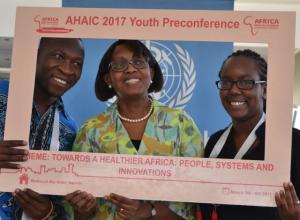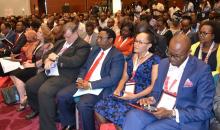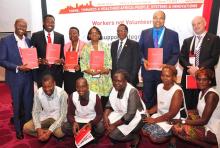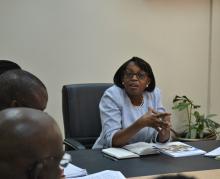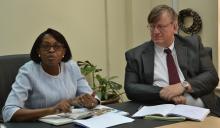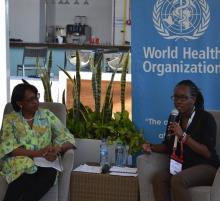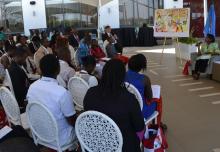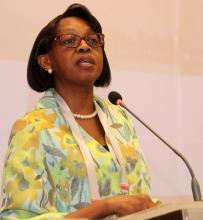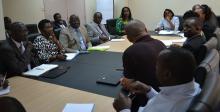RD calls for renewed approaches to health in Nairobi
Nairobi, March 7, 2017 - The African Health Agenda International Conference, AHAIC, in Nairobi set off to an enthused start with calls for realistic and holistic solutions that are informed by research and evidence, strengthening of health systems, commitment of governments through financing of health and engagement of youth and other actors to address the disease burden in the continent.
The conference, organized by AMREF Health Africa and dubbed “Towards a healthier Africa, people, systems and innovations,” brought together a cross section of health players in the continent and beyond.
The meeting was addressed by Dr Matshidiso Moeti, WHO Regional Director for Africa, who acknowledged Africa’s various health challenges and lessons learnt but called for good governance, leadership and stewardship. She said these would to ensure that the right and comprehensive policies and strategies were in place if Africa was going to attain the sustainable development goals.
She noted that lessons learned from the Millennium Development Goals had shown that investments in health by governments and health partners had not been optimal. Challenges in the health system had included:
- Health services in many countries being grossly underfunded, leading to sub-standard quality of care.
- Health care was often inaccessible geographically and financially for disadvantaged and marginalized populations.
- Inequities in access for health were compounded by a critical shortage of human resources which are unequally distributed and biased towards urban areas.
She said the African Region bore 24% of the global disease burden, but only 3% of the global health work force. This needed to change and “all of us need to ensure that health stays at the forefront of the political and development agenda, while it infuses with other social determinants.”
Health was at the heart of sustainable development goals (SDGs), she added.
She proposed a multi-sectoral action and new collaborations in which the civil society and the private sector were engaged for the success of SDG actions.
She said WHO was using a new approach to bring better health to Africa’s people through a new innovation called Transformation Agenda and which intended to promote results such as excellence, accountability and transparency, equity and innovation.
Lessons from the Ebola outbreak in West Africa revealed critical gaps in in WHO’s emergency preparedness.“We are therefore adjusting our programmes to have a smart technical focus in line with the Region’s priorities, basing interventions on evidence and lessons learned from experience”. “We have now reformed our Health Emergencies Programme and are part of a global WHO approach of one emergency programme, one workforce, one budget and one line of accountability.
She said WHO was also transforming its operations by putting people in places for strategic purposes, such as with our Health Emergencies Programme. The organization was also expanding our partnerships to embrace new ones such as African leaders, religious leaders, the private sector and philanthropic foundations/individuals.
She said WHO alongside the Ministry of Health in Guinea and international partners had led Ebola vaccine research during the epidemic which resulted in a safe and highly protective vaccine, the first to prevent infection, and an addition to our defenses against future outbreaks.
The Ebola outbreak had also led to the emergence of the Coalition for Epidemic Preparedness Innovations (CEPI), a public-private coalition that aims to derail epidemics by speeding up development of vaccines against emerging pathogens.
The meeting was also addressed by Dr Gitahi Githinji, CEO, Amref Health Africa and the Director of Medical Services (MOH) Dr Jackson Kioko, who lauded the involvement of young people in the conference and called for enhancing of capacities in health and in-depth research to inform policy.
Dr Moeti also held a town hall engagement with young people, who had attended a two-day preconference to address health issues among the youth in Africa.
In their communique, young people who attended a two-day preconference had urged that no policy decisions or actions should be taken without their engagement and involvement. “Any decisions on young people must be made in consultation with us – nothing for us without us, “ Dr Meggie Moka, representing the young people had earlier told delegates. She called on ‘bridging of gaps’ and ‘making adults allies’ in an effort to address health challenges facing African youth.
Dr Moeti said young people have to be engaged beyond rhetoric and slogans and that WHO was deliberately resuscitating adolescent health programmes to engage and include youth and provide opportunities within the organization that would ensure their ideas and efforts were given a chance.
Countries could replicate this approach to help prioritize the youth agenda, she added.
She told the town hall forum that there was need to have space and an enabling environment with elders and leaders where they can both speak about sexuality and other concerns without the latter being threatened.
In response to a question on young people making a contribution as participants in research and not as subjects, Dr Moeti said there are opportunities for young people to find spaces to influence funding opportunities and research decisions.
She said there was also need to address the paradox of health research in Africa being done by people from outside the continent and not defined and done by the countries themselves. “Research should inform service delivery and country needs,” she added.
It was critical for countries to also invest in financing of health and efficient ways of managing health without depending on donor funding.
____________________________________________
For more information, please contact:
Jemimah W Mwakisha, Communications & Social Mobilisation, Tel: +254 722509403, Cell: +254 710 149489, Email: mwakishaj [at] who.int (mwakishaj[at]who[dot]int)



